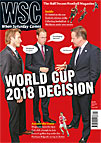 Derek Brookman discusses the possibility that Ajax’s recent mediocrity may not just be a passing phase
Derek Brookman discusses the possibility that Ajax’s recent mediocrity may not just be a passing phase
When Martin Jol’s Ajax embarked on a magnificent late-season run in the spring, winning their last 13 league matches in a row while scoring 47 times in the process, it seemed like – for the club’s supporters at least – the natural order was being restored.